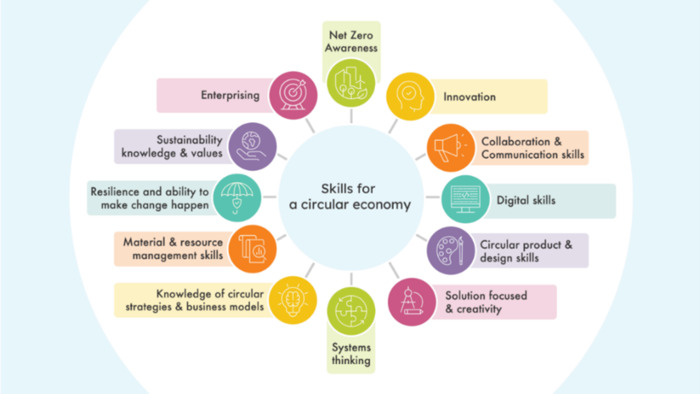Capturing the opportunities of a circular economy

Achieving a circular economy is a fundamental factor in Scotland’s journey to net-zero.
To delve into the detail of a cleaner, greener future, Scottish Renewable’s Energy Transition and Supply Chain team recently sat down with colleagues at Zero Waste Scotland to un-pack the reality of transforming the renewable energy sector’s approach to material use.
Moving away from a linear economy is not only an environmental necessity but offers tremendous potential for high-value job creation and economic expansion.
Initial findings from the Coalition for Wind Industry Circularity (CWIC) suggest that building circular supply chain capabilities has the potential to benefit the UK economy by £1.6 billion Gross Value Added (GVA) between 2025 and 2035.
This figure comprises of parts refurbished during their operational life but further substantial opportunity lies within wind turbine decommissioning activity.
With sustainability at its heart, Scotland’s renewable energy sector is well placed to lead the way in realising this opportunity and to develop industry standards that prioritise resource recovery, reuse, repair and remanufacture.
However, there is work to be done.
The Zero Waste Scotland ‘Circularity Gap' report places Scotland's circularity index at 1.3 indicating that more than 98% of its resources originate from virgin sources. This means Scotland is significantly below the global average of 8.6%. According to the report, improving Scotland’s index and putting circular strategies into action has the potential to generate 60,000 new jobs, especially in labour intensive sectors like repair, maintenance, and waste management (Figure 1).
Discussing the report, Deborah Mooney from Zero Waste Scotland said:
“A circular economy avoids resource waste by keeping goods and materials in a loop. It shifts from a traditional take-make-waste economic model to one which maximises value extracted from resources.
“The green job opportunities arising from making this essential shift offer a huge opportunity for the country, the great thing about circular economy roles is that they will harness existing skillsets, ones that Scotland is already celebrated for”.

Figure 1: Skills for a Circular Economy
Scottish Renewables member, ReBlade, is one of the innovative supply chain companies grasping the pipeline of work up for grabs from a circular economy.
Discussing this opportunity, Fiona Lindsay, Managing Director of Reblade said:
“Reblade is focussed on supporting the creation of new and emerging net-zero economy roles through work-based circular economy learning and collaboration with the wind industry and Zero Waste Scotland”
So why aren't these opportunities being captured at the scale we need?
The skills gap is a key as a barrier to our net-zero ambitions.
The PublicFirst ‘Generation Green Jobs' report suggests that young people have a very limited understanding of how net-zero will impact industries, jobs and their lives. For example:
- Young people believe environmental and conservation sectors to have the most "green jobs," but in reality, there are far more opportunities in the renewable energy sector.
- Poor pay is seen as the top disadvantage of green jobs with 25% of young people identifying this as a barrier despite the competitive salaries of many roles in the green industries.
- Those who work in the green economy are most commonly perceived to be young and have attended university to study science, technology engineering and mathematics (STEM) disciplines.
The reality is that a diverse range of highly skilled, well-paid jobs will emerge as we begin to decommission energy assets including roles not traditionally aligned to STEM subjects.
The key positions required will include:
- Industrial designers to experiment around the reuse of energy assets.
- Material innovation specialists to identify applications and solutions for decommissioned components.
- Urban miners to scout for materials and components to be recovered.
- Brokers and data analysts to develop national databases of decommissioned assets.
- Sales and marketing roles to highlight the sustainability activities across the energy sector.
- Health and safety environmental managers to assess materials for reuse.
- Energy infrastructure product designers to design for disassembly.
Deborah Mooney from Zero Waste Scotland, continued:
“To support green skills and the growth of the circular economy supply chain it is imperative young people are encouraged to take up roles across the energy transition.
“On-going research from Zero Waste Scotland suggests that academia will play an indispensable role in enabling skills development and must embed a circular economy as a mindset in all education institutions. Governments and employers must also lead by example by placing the utmost value on circular solutions.”
Transitioning to a circular economy is vital for Scotland's net-zero goals, offering substantial economic gains and job opportunities. While the renewable energy sector is poised to lead, addressing the skills gap and raising awareness with younger generations about diverse job opportunities is imperative.
As the energy landscape transforms, collaboration between academia, governments, and employers is crucial to instil a circular mindset and unlock the full potential of green jobs for a sustainable and prosperous future.